Avoid infecting your system with malware via "Order Confirmation" emails
Phishing/ScamAlso Known As: Order Confirmation spam
Get free scan and check if your device is infected.
Remove it nowTo use full-featured product, you have to purchase a license for Combo Cleaner. Seven days free trial available. Combo Cleaner is owned and operated by RCS LT, the parent company of PCRisk.com.
What is "Order Confirmation Email Virus"?
Similar to BID PURCHASE DOCUMENT Email Virus, Swisscom Email Virus, Complaint Email Virus, and many others, "Order Confirmation Email Virus" is a spam email campaign used to proliferate a high-risk trojan called Emotet.
Cyber criminals send thousands of deceptive emails delivered with attachments that users are encouraged to open. Be aware, however, that the attached files (Microsoft Office documents) are malicious - they download and install Emotet into the system.
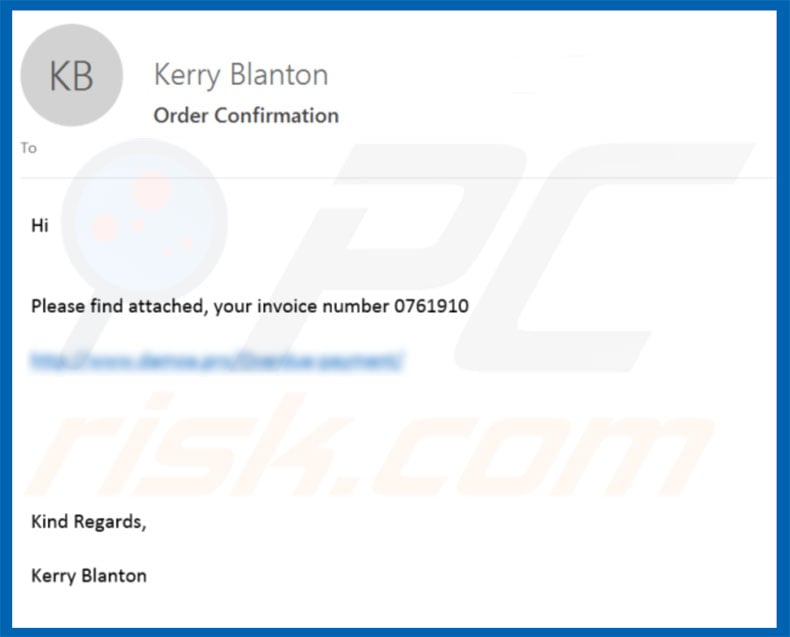
"Order Confirmation Email Virus" overview
"Order Confirmation Email Virus" campaign emails deliver messages stating that users have received invoices and encourage them to open the attachments. This is a scam.
Opened documents immediately infect systems with the Emotet virus. Note that the entire email is presented as an official order confirmation. This is common among cyber criminals.
They often claim to be employees of legitimate companies (especially large organizations) or governmental agencies. They do this to increase the number of infections - users are much more likely to open files when they are received from familiar names/email addresses.
Emotet is high-risk malware that records personal information and proliferates other viruses. It often collects logins/passwords, web browsing details, and other similar information. Furthermore, Emotet opens "backdoors" for other viruses to infiltrate the system.
Infiltrated malware might also record personal information. damage stored files, misuse system resources to mine cryptocurrencies, and so on. In summary, Emotet's presence can lead to serious privacy issues, and significant financial and data loss. If you have recently opened "Order Confirmation Email Virus" campaign attachments, your computer is likely to be infected.
Therefore, you should immediately scan it with a reputable anti-virus/anti-spyware suite and eliminate all threats.
| Name | Order Confirmation spam |
| Threat Type | Trojan, Password stealing virus, Banking malware, Spyware |
| Symptoms | Trojans are designed to stealthily infiltrate victim's computer and remain silent thus no particular symptoms are clearly visible on an infected machine. |
| Distribution methods | Infected email attachments, malicious online advertisements, social engineering, software cracks. |
| Damage | Stolen banking information, passwords, identity theft, victim's computer added to a botnet. |
| Malware Removal (Windows) |
To eliminate possible malware infections, scan your computer with legitimate antivirus software. Our security researchers recommend using Combo Cleaner. Download Combo CleanerTo use full-featured product, you have to purchase a license for Combo Cleaner. 7 days free trial available. Combo Cleaner is owned and operated by RCS LT, the parent company of PCRisk.com. |
Malspam campaign spread malware examples
The Internet is full of trojan-type viruses that share similarities with Emotet. TrickBot, FormBook, and LokiBot - these are just some examples from many.
As with Emotet, these viruses are also proliferated using spam email campaigns. Furthermore, they can also record sensitive information and distribute other malware (e.g., ransomware).
Therefore, all trojan-type viruses pose a significant threat to your privacy and web browsing safety. You should eliminate them immediately.
How did "Order Confirmation Email Virus" infect my computer?
As mentioned, "Order Confirmation Email Virus" emails come together with malicious Microsoft Office documents. Immediately after opening these files, users are asked to enable macro commands, otherwise the content will not be displayed properly.
In doing so, users grant attachments permission to execute commands that stealthily download and install Emotet. This malware distribution method is simple and effective, however, it has a major flaw - attachments are unable to download malware if the user is not using Microsoft Office.
If, for example, the .doc file is opened using an application other than MS Word, the malware will not be downloaded. Emotet targets the Microsoft Windows Operating System only and, therefore, users of other platforms are safe.
How to avoid installation of malware?
Lack of knowledge and careless behavior are the main reasons for computer infections. The key to safety is caution. Therefore, pay close attention when browsing the Internet. We strongly recommend that you think twice before opening email attachments.
Files that are irrelevant or have been received from a suspicious/unrecognizable email address should never be opened. In addition, have a reputable anti-virus/anti-spyware suite installed and running.
These tools detect and eliminate infectious files before they perform malicious actions. If you have already opened an "Order Confirmation Email Virus" attachment, we recommend running a scan with Combo Cleaner Antivirus for Windows to automatically eliminate infiltrated malware.
Text presented in the "Order Confirmation Email Virus" email messages:
Subject: Order Confirmation
Hello, Miss
Your order is now safely with us. The details of your order are below.
Your order confirmation is below. Thank you again for your business.
Shipping Information:
Miss
Details for order 81MU-56704
For detailed information, quick order adjustment or cancellation, please
use the special link form provided below
Subject: Order Confirmation
Hi Please find attached, your invoice number 0761910
hxxp://www.damoa.pro/overdue-payments/
Kind Regards,
Kerry Blanton
Malicious attachment distributed via "Order Confirmation Email Virus" spam campaign:
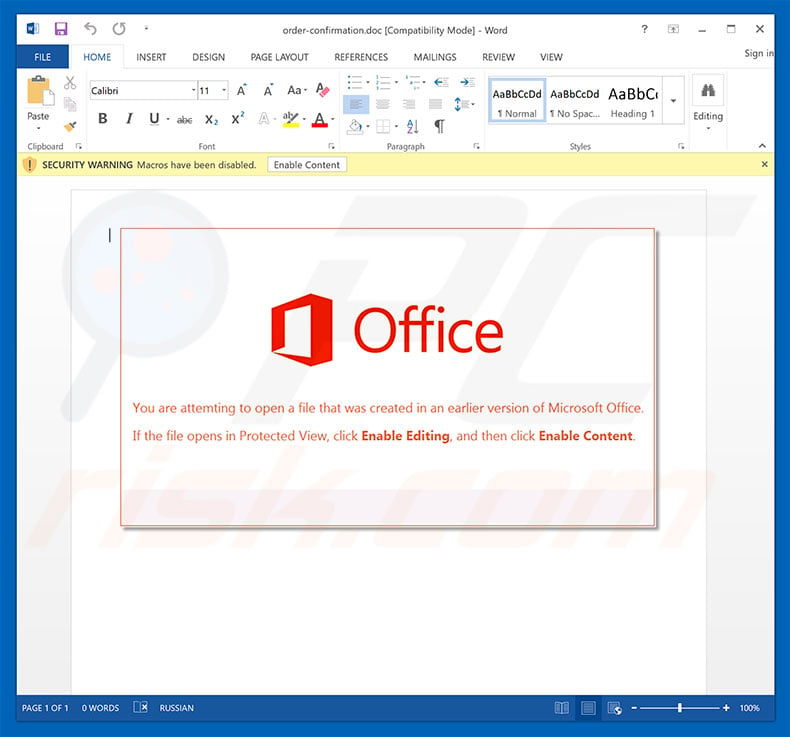
Emotet trojan process in Windows Task Manager:
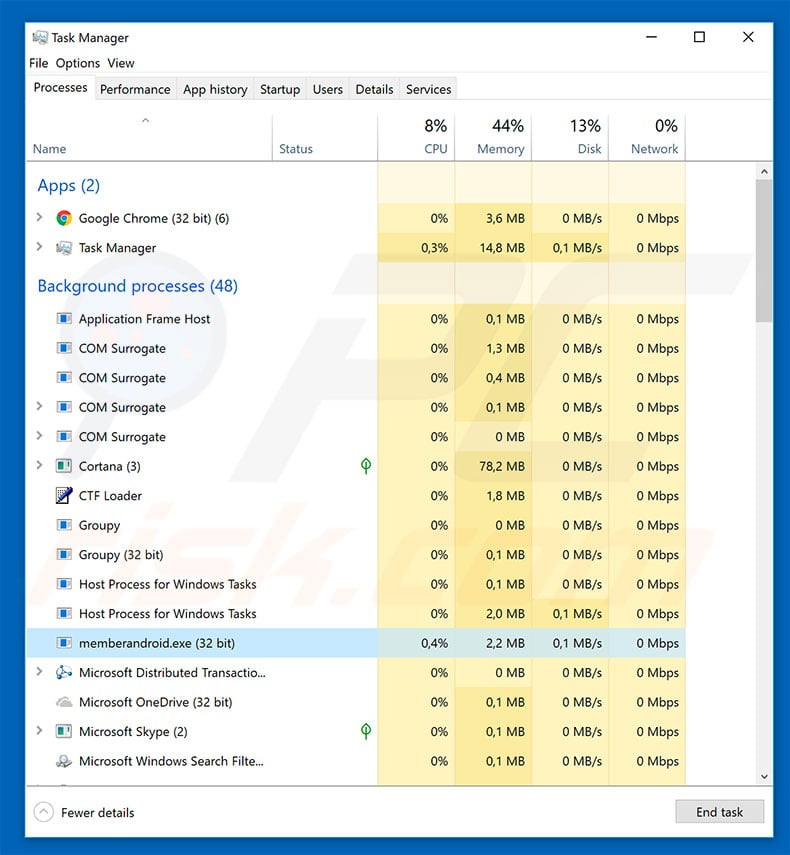
Another example of "Order Confirmation" email scam - this one tries to trick computer users into calling a number presented in this fake email:
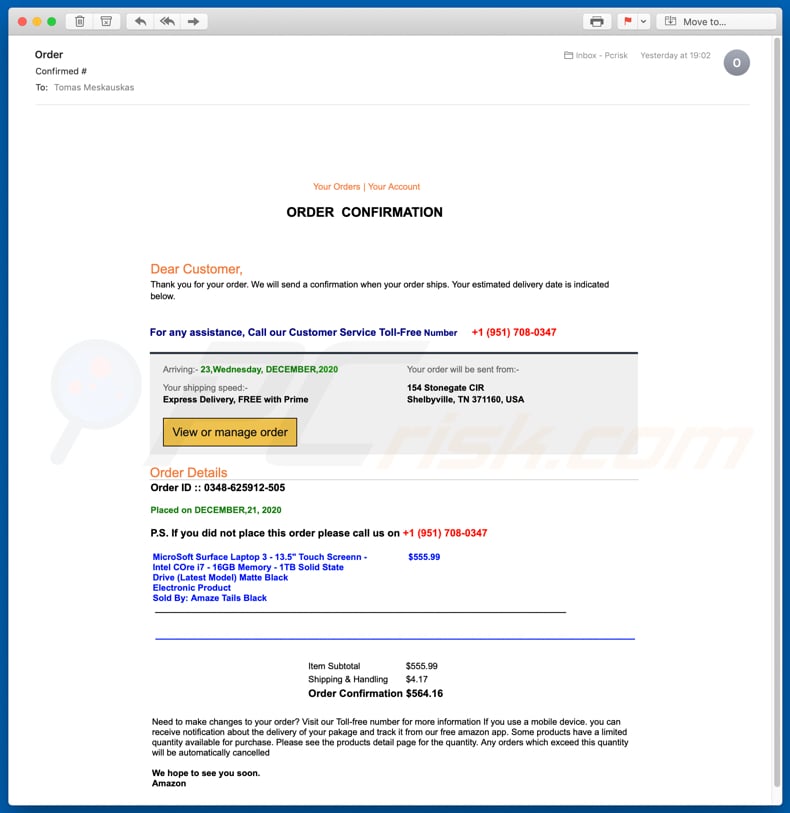
Text presented in this scam email:
CONFIRMATION
Dear Customer,Thank you for your order. We will send a confirmation when your order ships. Your estimated delivery date is indicated below.For any assistance, Call our Customer Service Toll-Free Number +1 (951) 708-0347
Arriving:- 23,Wednesday, DECEMBER,2020Your shipping speed:-
Express Delivery, FREE with Prime
View or manage order
Your order will be sent from:-154 Stonegate CIR
Shelbyville, TN 371160, USAOrder Details
Order ID :: 0348-625912-505Placed on DECEMBER,21, 2020
P.S. If you did not place this order please call us on +1 (951) 708-0347
MicroSoft Surface Laptop 3 - 13.5" Touch Screenn - $555.99
Intel COre i7 - 16GB Memory - 1TB Solid State
Drive (Latest Model) Matte Black
Electronic Product
Sold By: Amaze Tails Black
Item Subtotal $555.99
Shipping & Handling $4.17
Order Confirmation$564.16
Need to make changes to your order? Visit our Toll-free number for more information If you use a mobile device. you can receive notification about the delivery of your pakage and track it from our free amazon app. Some products have a limited quantity available for purchase. Please see the products detail page for the quantity. Any orders which exceed this quantity will be automatically cancelled
We hope to see you soon.
Amazon
Yet another order confirmation-themed spam email promoting a malicious MS PowerPoint file:
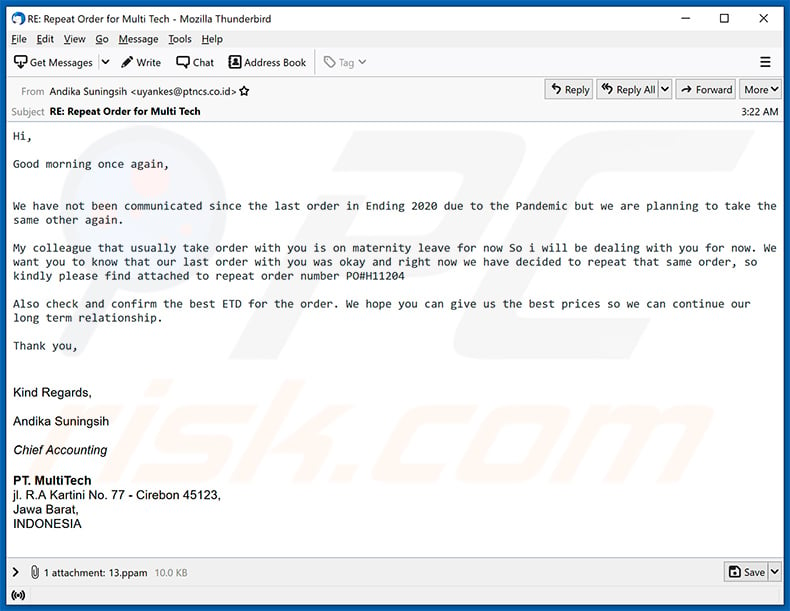
Text presented within:
Subject: RE: Repeat Order for Multi Tech
Hi,Good morning once again,
We have not been communicated since the last order in Ending 2020 due to the Pandemic but we are planning to take the same other again.My colleague that usually take order with you is on maternity leave for now So i will be dealing with you for now. We want you to know that our last order with you was okay and right now we have decided to repeat that same order, so kindly please find attached to repeat order number PO#H11204
Also check and confirm the best ETD for the order. We hope you can give us the best prices so we can continue our long term relationship.
Thank you,
Kind Regards,Andika Suningsih
Chief Accounting
PT. MultiTech
jl. R.A Kartini No. 77 - Cirebon 45123,
Jawa Barat,
INDONESIA
Another example of an email from "Order Confirmation" spam campaign:
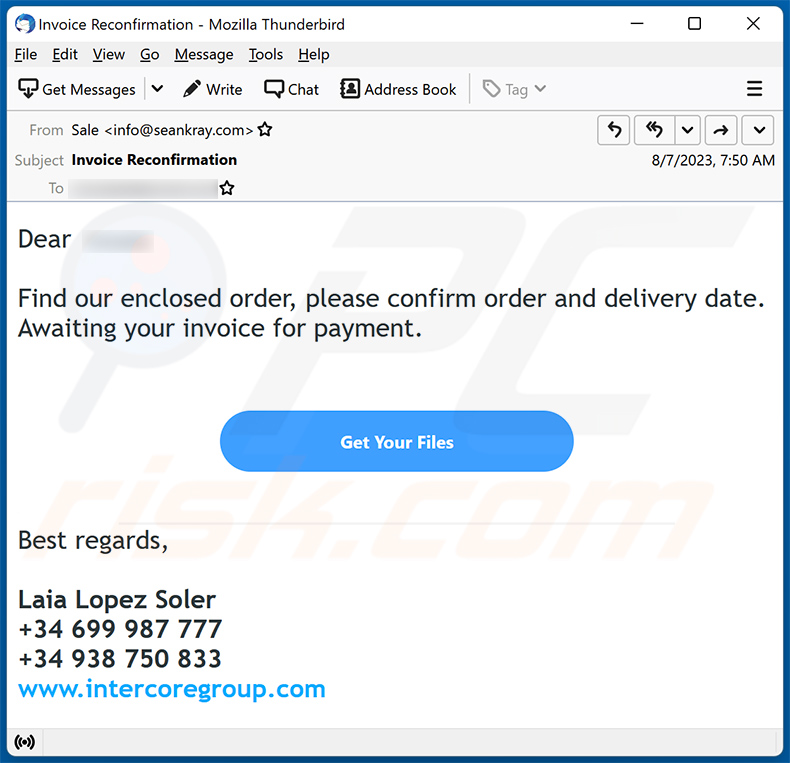
Text presented within:
Subject: Invoice Reconfirmation
Dear -
Find our enclosed order, please confirm order and delivery date.
Awaiting your invoice for payment.
Get Your FilesBest regards,
Laia Lopez Soler
+34 699 987 777
+34 938 750 833
www.intercoregroup.com
Instant automatic malware removal:
Manual threat removal might be a lengthy and complicated process that requires advanced IT skills. Combo Cleaner is a professional automatic malware removal tool that is recommended to get rid of malware. Download it by clicking the button below:
DOWNLOAD Combo CleanerBy downloading any software listed on this website you agree to our Privacy Policy and Terms of Use. To use full-featured product, you have to purchase a license for Combo Cleaner. 7 days free trial available. Combo Cleaner is owned and operated by RCS LT, the parent company of PCRisk.com.
Quick menu:
- What is Order Confirmation spam?
- Types of malicious emails.
- How to spot a malicious email?
- What to do if you fell for an email scam?
Types of malicious emails:
![]() Phishing Emails
Phishing Emails
Most commonly, cybercriminals use deceptive emails to trick Internet users into giving away their sensitive private information, for example, login information for various online services, email accounts, or online banking information.
Such attacks are called phishing. In a phishing attack, cybercriminals usually send an email message with some popular service logo (for example, Microsoft, DHL, Amazon, Netflix), create urgency (wrong shipping address, expired password, etc.), and place a link which they hope their potential victims will click on.
After clicking the link presented in such email message, victims are redirected to a fake website that looks identical or extremely similar to the original one. Victims are then asked to enter their password, credit card details, or some other information that gets stolen by cybercriminals.
![]() Emails with Malicious Attachments
Emails with Malicious Attachments
Another popular attack vector is email spam with malicious attachments that infect users' computers with malware. Malicious attachments usually carry trojans that are capable of stealing passwords, banking information, and other sensitive information.
In such attacks, cybercriminals' main goal is to trick their potential victims into opening an infected email attachment. To achieve this goal, email messages usually talk about recently received invoices, faxes, or voice messages.
If a potential victim falls for the lure and opens the attachment, their computers get infected, and cybercriminals can collect a lot of sensitive information.
While it's a more complicated method to steal personal information (spam filters and antivirus programs usually detect such attempts), if successful, cybercriminals can get a much wider array of data and can collect information for a long period of time.
![]() Sextortion Emails
Sextortion Emails
This is a type of phishing. In this case, users receive an email claiming that a cybercriminal could access the webcam of the potential victim and has a video recording of one's masturbation.
To get rid of the video, victims are asked to pay a ransom (usually using Bitcoin or another cryptocurrency). Nevertheless, all of these claims are false - users who receive such emails should ignore and delete them.
How to spot a malicious email?
While cyber criminals try to make their lure emails look trustworthy, here are some things that you should look for when trying to spot a phishing email:
- Check the sender's ("from") email address: Hover your mouse over the "from" address and check if it's legitimate. For example, if you received an email from Microsoft, be sure to check if the email address is @microsoft.com and not something suspicious like @m1crosoft.com, @microsfot.com, @account-security-noreply.com, etc.
- Check for generic greetings: If the greeting in the email is "Dear user", "Dear @youremail.com", "Dear valued customer", this should raise suspiciousness. Most commonly, companies call you by your name. Lack of this information could signal a phishing attempt.
- Check the links in the email: Hover your mouse over the link presented in the email, if the link that appears seems suspicious, don't click it. For example, if you received an email from Microsoft and the link in the email shows that it will go to firebasestorage.googleapis.com/v0... you shouldn't trust it. It's best not to click any links in the emails but to visit the company website that sent you the email in the first place.
- Don't blindly trust email attachments: Most commonly, legitimate companies will ask you to log in to their website and to view any documents there; if you received an email with an attachment, it's a good idea to scan it with an antivirus application. Infected email attachments are a common attack vector used by cybercriminals.
To minimise the risk of opening phishing and malicious emails we recommend using Combo Cleaner Antivirus for Windows.
Example of a spam email:

What to do if you fell for an email scam?
- If you clicked on a link in a phishing email and entered your password - be sure to change your password as soon as possible. Usually, cybercriminals collect stolen credentials and then sell them to other groups that use them for malicious purposes. If you change your password in a timely manner, there's a chance that criminals won't have enough time to do any damage.
- If you entered your credit card information - contact your bank as soon as possible and explain the situation. There's a good chance that you will need to cancel your compromised credit card and get a new one.
- If you see any signs of identity theft - you should immediately contact the Federal Trade Commission. This institution will collect information about your situation and create a personal recovery plan.
- If you opened a malicious attachment - your computer is probably infected, you should scan it with a reputable antivirus application. For this purpose, we recommend using Combo Cleaner Antivirus for Windows.
- Help other Internet users - report phishing emails to Anti-Phishing Working Group, FBI’s Internet Crime Complaint Center, National Fraud Information Center and U.S. Department of Justice.
Frequently Asked Questions (FAQ)
Why did I receive this email?
Spam emails are not personal. Cyber criminals send them in large-scale operations - hence, thousands of users receive identical letters.
I have read a spam email but didn't open the attachment, is my computer infected?
No, merely reading such an email will not trigger any system infection process. Malware download/installation is jumpstarted when the files attached to or links contained in malspam letters - are opened/clicked.
I have downloaded and opened a file attached to a spam email, is my computer infected?
Whether an infection was triggered might depend on the opened file's format. If it was an executable (.exe, .run, etc.) - most likely, yes - your system was infected. However, document formats (.doc, .xls, .pdf, etc.) may require additional user actions (e.g., enabling macro commands) - to begin downloading/installing malware.
Will Combo Cleaner remove malware infections present in email attachments?
Yes, Combo Cleaner is capable of detecting and eliminating most of the known malware infections. It has to be emphasized performing a complete system scan is paramount - since sophisticated malicious software usually hides deep within systems.
Share:

Tomas Meskauskas
Expert security researcher, professional malware analyst
I am passionate about computer security and technology. I have an experience of over 10 years working in various companies related to computer technical issue solving and Internet security. I have been working as an author and editor for pcrisk.com since 2010. Follow me on Twitter and LinkedIn to stay informed about the latest online security threats.
PCrisk security portal is brought by a company RCS LT.
Joined forces of security researchers help educate computer users about the latest online security threats. More information about the company RCS LT.
Our malware removal guides are free. However, if you want to support us you can send us a donation.
DonatePCrisk security portal is brought by a company RCS LT.
Joined forces of security researchers help educate computer users about the latest online security threats. More information about the company RCS LT.
Our malware removal guides are free. However, if you want to support us you can send us a donation.
Donate
▼ Show Discussion